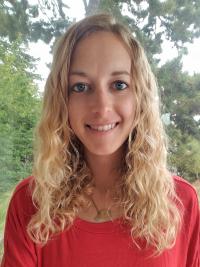Katherine Dale, a PhD student at the University of California, Santa Cruz, has been awarded a NOAA National Marine Fisheries Service (NMFS)-Sea Grant Fellowship.
Dale is among ten graduate students nationwide who were selected for the nationally competitive research fellowship, which supports students pursuing doctoral degrees in population and ecosystem dynamics as well as marine resources economics. The program is a focused workforce development effort to train highly qualified professionals in areas of critical need for NOAA’s science-based approach to fisheries management.
Dale sees this as an opportunity that brings her closer to her goal of bridging the gap between computer science and ecology: “This fellowship gives me the opportunity to connect with amazing NOAA scientists doing important quantitative fisheries research as well as further my own computational skills.”
Fellows are chosen through a competitive national selection process. This year, nine population and ecosystem dynamics fellowships and one marine resource economics fellowship were selected.
Since the fellowship began, it has supported over 100 population and ecosystem dynamics and 35 marine resource economics doctoral fellows. A 2018 review of the program found that 92% of fellows remain in their field and about 30% work for NOAA as a fisheries scientist. Alumni of this fellowship typically hold future positions in NOAA Fisheries, other agencies, academics and fishery management councils.
Meet the 2020 California NMFS-Sea Grant fellow

Katherine Dale is a PhD student at the University of California Santa Cruz studying the distribution, connectivity, and diversity of eel populations along the coast of California and Central America. Katherine has a bachelor’s degree in marine and atmospheric science from the University of Miami, and also completed work on tuna and salmonids for the National Oceanic and Atmospheric Administration. Besides early life history, she is also interested in migration, feeding ecology, and bridging the gap between classic computer science and field ecology through innovative bioinformatics, modeling, and “Big Data” analysis.
Project Summary: Predicting spatio-temporal shifts in larval fish abundance in the eastern Pacific using Bayesian hierarchical modeling
More information
About California Sea Grant
NOAA’s California Sea Grant College Program funds marine research, education and outreach throughout California. Headquartered at Scripps Institution of Oceanography at the University of California San Diego, California Sea Grant is one of 34 Sea Grant programs in the National Oceanic and Atmospheric Administration (NOAA), U.S. Department of Commerce.